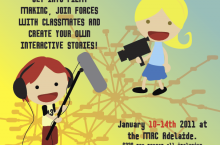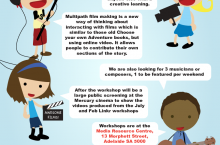Changing the Educational Paradigm
Through a series of powerful and radical videos I would like to explain how we need to change the current educational paradigm.
Why is Online Video so powerful?
As Chris Anderson, the owner of the amazingly inspiring TED organisation shows, online video is powering global innovation.
Chris Anderson: How web video powers global innovation
Children Driven Self-Education
Sugata Mitra talks about child-driven self education. Leaving computers in a ‘hole-in-the-wall’ in some of the poorest places in India taught them how to use a computer, how to speak English, bio-technology and much more.
He makes some great points about children working in groups, with 2 or 3 children per computer. He also promotes the use of the ‘nanny’ way.
Changing Education Paradigms
Sir Ken Robinson talks about how every country in the world is trying to reform the education system.
This is mainly because of economic and cultural reasons.
He mentions how having a degree is no longer a guarantee for getting a job, and most critically, he explains how the current system was designed in the enlightenment period of the 1800’s. It was based on a very different concept of the human mind than that of today and was geared towards the economic requirements of the industrial revolution. The system assumed that people were either academic or not.
Sir Robinson then shows a heat map of where people in USA are treated for ADHD (Attention deficit hyperactivity disorder). It shows an increasing weight towards the eastern states, such as Washington and New York. He believes that it’s no wonder we are having issues trying to get children to pay attention during schools. Kids today grow up with advertising, computer games, smart phones, social networking, and all manner of distractions, yet our outdated education system is trying to get them to learn boring stuff. It’s little wonder we are having to drug our children up to anaesthetise them through school, “I think we should be doing the exact opposite. We should be WAKING them up to what they have inside of themselves”.
Ken explains that our education system is modelled on, and in the image of Industrialisation. Schools are organised on factory lines. Ringing bells, separate facilities, specialised classes, batched learning (putting children together according to their age and not their learning potential). We’ve been increasing the amount of standardised testing when we should be going in the exact opposite direction.
The talk then explains how children are better at divergent thinking, yet as we grow older we lose this ability. He believes this is because as we get older we get educated to believe that there’s one answer, it’s in the back of the book, but we aren’t to look at it, nor copy others as that’s cheating. Yet in the real world that’s called collaboration.
We have to think differently about human potential. Academic, non-academic, abstract, theoretical, and vocational. We have to understand that most great learning happens in groups, and we have to change the habits and habitats of our institutions.
Salman Khan – Humanising the classroom
This is a great talk by the creator of the Khan academy. He explains how he started the online video repository and the amazing work being done. Showing the sheer power of this, some schools have made the Khan academy a part their curriculum by getting kids to watch the lessons as part of their homework and what was normally homework is now what the kids do at school with the teachers. From a Films on the Fly perspective it seems like the Khan Academy has already created 90% of the features we had envisioned for using online video to help change the educational paradigm.
Michael Kubler’s Personal Take
We know that people learn in different ways. Different senses, different explanations, different requirements and concepts. Some people are good at listening, others by writing what they are listening to, lots of people learn by watching videos, others by reading, and for a lot of some concepts to properly understand them you need to get in and play with it.
We also have the brain rules. The 12 rules on how the brain works.
- Rule #1: Exercise — Exercise boosts brain power.
- Rule #2: Survival – The human brain evolved, too.
- Rule #3: Wiring – Every brain is wired differently.
- Rule #4: Attention – We don’t pay attention to boring things.
- Rule #5: Short-term memory – Repeat to remember.
- Rule #6: Long-term memory – Remember to repeat.
- Rule #7: Sleep – Sleep well, think well.
- Rule #8: Stress – Stressed brains don’t learn the same way.
- Rule #9: Sensory Integration – Stimulate more of the senses.
- Rule #10: Vision – Vision trumps all other senses.
- Rule #11: Gender – Male and female brains are different.
- Rule #12: Exploration – We are powerful and natural explorers.
When putting together the concepts of child driven self-education, the power of online video, the brain rules and Intrinsic motivation, we can start to create a new educational paradigm.
Personally, I think that there are a small number of compulsory concepts that should be taught in school.
Learning how to learn — As with the brain rules, self-education and the power of online video, we need to explain different ways of learning and let students work out which ways they find are the best.
Critical Thinking — It’s great that children know how to learn, but without critical thinking skills they will be unable to determine a plausible explanation or viable concept compared to snake oil. From a proper argument versus an Ad Hominem attack, or an Appeal to authority.
Information Literacy — “To be information literate, a person must be able to recognize when information is needed and have the ability to locate, evaluate, and use effectively the needed information” The American Library Association. This is one thing I did manage to learn from school to an OK level, although things like Wikipedia have changed how we think about information.
The Scientific Method — The Scientific method is a body of techniques for investigating phenomena, acquiring new knowledge, or correcting and integrating previous knowledge. As per the amazing talk by David Deutsch on a new way to explain explanation the scientific method has changed the way we determine our assertions of reality.
With those main concepts plus an education system which is based around fostering children’s already existing hunger for learning and natural curiosity, we can truly empower the youth of today to make an amazing future tomorrow.
Some examples of mixing up education.
- I like hiking, I also love listening to audio books. A group of 20 people could load themselves up with iPods, and other such MP3 players, all start listening to the same educational audio book at the same time, and go hiking together. When everyone has set up camp for the night and are all sitting around the fire you can all talk about the audiobook you’ve just listened to. I particularly love The Teaching Company’s courses, even if they are rather expensive.
- Group students together by learning styles and level of experience, not by age group or gender.
- Display results as experience points, in different areas, not as A-, B+, C, D, or Fail. For example, instead of getting a pass or fail you could give an A grade student 100 experience points in that particular area whilst others might not get as many experience points in that area. You can then graph peoples experiences in different areas like a radar graph
The managing director of Films on the Fly, Michael Kubler, has had an interest in human behaviour, learning techniques, brain rules, phantoms in the brain, and much more for a number of years. From that he’s started developing an interest and passion in changing the educational paradigm and hopes that people like yourself will also develop an interest.
Updates :
- http://venturebeat.com/2011/06/27/where-to-hack-education-and-where-to-stack-it/ — A post by Venturebeat saying that some things in the education system need to be replaced (hacked), but some need to be done even more so (stacked).
- The TED talk by Sir Ken Robinson about how Schools kill creativity is the highest watched talk on TED.com with over 8.6million views (as of 28th June 2011).
- The Khan Academy has had a TED talk and is expanding in size (March 2011).













3 Responses to “Changing the Educational Paradigm”